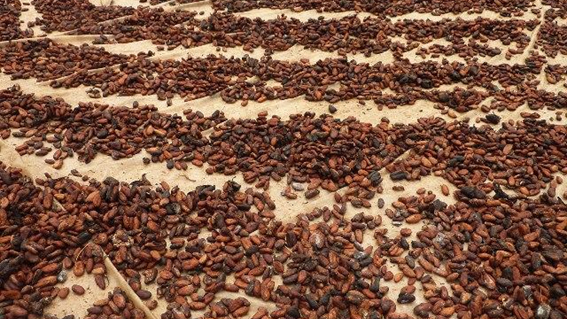To mark Brazil’s Cocoa Day on March 26, we have produced a special article highlighting Fundo Vale’s technical and financial support for this production chain

The article “Agroforestry in Cocoa: Perspectives and Solutions,” published by the Swiss Platform for Sustainable Cocoa (SWISSCO) in February 2025, provides an analysis of the advantages of agroforestry cocoa production. According to the article, agroforestry systems have been gaining prominence on the global stage for their potential to tackle urgent global challenges such as biodiversity conservation, climate change, food security and sustainable development.
Growing cocoa through agroforestry systems offers major advantages over conventional full-sun cultivation systems. The trees help regulate the microclimate around the plants, reduce temperature fluctuations, retain soil moisture and fertility, and support nutrient cycling. Agroforestry also decreases the plants’ vulnerability to pests and diseases, while considerably increasing carbon sequestration in the soil.
From a socioeconomic point of view, while conventional systems can offer higher yields more quickly, agroforestry systems guarantee more stable and sustainable productivity in the long term. According to CocoaAction Brasil, an initiative created by the World Cocoa Foundation, approximately 70% of cocoa production in Brazil comes from family farming. For these producers, agroforestry cocoa cultivation represents an opportunity. By growing multiple species, they can access different markets and reduce the risks associated with price fluctuations. In addition, the rational use of inputs tends to reduce production costs, thus improving producers’ income.
However, the transition to agroforestry systems is not without its challenges, as the article highlights. A lack of capital to invest in seedlings, tools and training can be an obstacle for small producers. Furthermore, insecure land tenure in many producing regions can discourage farmers from adopting long-term practices.
To overcome these barriers, the article highlights the need for support from governments, companies and civil society organizations. Financial incentives, such as payments for environmental services and improved access to markets for diversified products, can make agroforestry systems more attractive. Additionally, training programs and technical assistance are key to ensuring the success of the transition.
Technical and financial support
As part of Vale’s 2030 Forest Goal, which aims to restore 100,000 hectares of habitat by the end of the decade, Fundo Vale is supporting the strengthening of sustainability in Brazil’s cocoa chain. This is achieved through technical and financial support for impact businesses that prioritize sustainable agricultural production systems, while also promoting profitability and improved quality of life for the communities involved.
“Strengthening sustainable practices in the cocoa chain is one of our priorities and involves strategic investments that combine technical training, innovation and socioeconomic impact. Knowledge is a cornerstone for building a sustainable production chain. Through training and support for demonstration farms, we seek to expand access to agroforestry best practices and boost land restoration on a large scale,” explains Liz Lacerda from Fundo Vale’s Partnerships and Business Promotion area.
With support from Fundo Vale and other organizations, Belterra has already restored more than 3,000 hectares of land in the Amazon Rainforest, Atlantic Forest and Cerrado Savanna, using agroforestry systems and silvopastoral systems. With the aim of expanding cocoa production to 40,000 hectares by 2030, the company operates cocoa nurseries in several Brazilian states.
In 2024, Fundo Vale, in partnership with the Institute for Forest and Agricultural Management and Certification (Imaflora) and CocoaAction Brasil, supported the implementation of two cocoa demonstration farms in the municipalities of Uruará and Marabá, in the state of Pará. With technical support from Imaflora and in collaboration with institutions such as the Pará State Forestry Development and Biodiversity Agency (Ideflor-Bio), the Uruará Municipal Agriculture Secretariat and the Brazilian Micro and Small Enterprise Support Service (SEBRAE), these demonstration farms serve as practical learning spaces. There, producers can test innovations and techniques adapted to their circumstances, boosting productivity and strengthening the sustainability of the cocoa chain.
As well as supporting these demonstration farms, Fundo Vale has organized training events in seven municipalities across Pará, equipping hundreds of technical assistance agents with knowledge of subjects such as cocoa tree management, soil analysis and sustainability practices. This initiative is part of the 2030 Cocoa Project, which seeks to encourage the implementation of agricultural best practices and accelerate the sustainable development of the Brazilian production chain.
“Technical assistance is essential to help increase productivity and profitability in agroforestry systems by growing cocoa. However, there is still a significant gap in such services, particularly for agroforestry systems. Fundo Vale plays a critical role by supporting the establishment of demonstration farms, training technicians and disseminating knowledge about agroforestry cocoa cultivation,” says Guilherme Salata, the coordinator of CocoaAction Brasil.
In addition to the partnership with Imaflora and CocoaAction Brasil to establish demonstration farms, Fundo Vale is also collaborating with the Belterra Institute on the Agroforestry Dialogues project. This initiative fosters the exchange of experiences and collective solutions among organizations working in regenerative agriculture. Key topics include forest restoration, land tenure security, regulatory frameworks for agroforestry businesses, business models, investment attraction and the development of agroforestry production chains.
